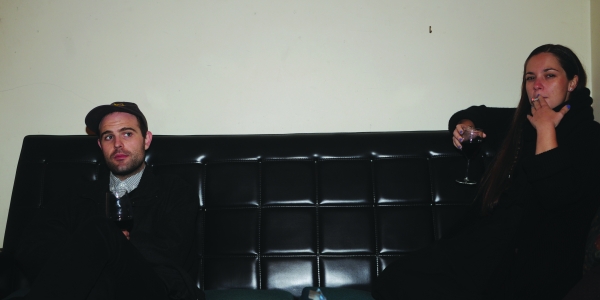Recorded in a relatively short period of time in mid-2011, Commercial Music saw release this August. The long gestation period, however, is all part of the duo’s ethos. “I’m not sure how it works with other bands, but I know for Jarrod and I there’s always been that turnaround in terms of when we record to when we release. We’re both busy, plus there’s agreeing on artwork and mastering, mixing done. It always seems to be this huge, long process,” Venerosa recalls.
Despite crafting tracks which often clock into the ten-minute-plus mark, you’d be wrong to assume the material is the result of studio improvisation. “It’s 99.9 percent rehearsed, structured material that we go into recording with,” she explains. “So we have the songs that we’re going to record, they’re all structured. There’s no improvisation. The only difference is that there may be something like ten seconds difference between takes. It’s based on feeling while recording sections of songs, like the beginning might be longer than we planned, or the ending might be longer. So it can vary a little bit like that, but we go in there with fully structured, functioning songs.”
Commercial Music marks the return of ECSR/Total Control guitarist Mikey Young as the duo’s producer. Once ubiquitous on the liner notes of Melbourne garage bands, Young has become more selective as he focuses on Total Control’s pursuits. “There’s not really any creative collaboration, I just think Mikey is a really awesome person to work with. He just let us take full control,” Nisa says, skirting an inadvertent pun. “We work better with someone who steps back a little bit. Especially with Jarrod – he knows what he wants more so than anyone I’ve met. Mikey is just someone we know and that we get along with as a person, it’s really as simple as that. Plus we liked how our last album sounded.”
The space of time between an album’s recording and its release sees the band enveloping their material in a way, with an album’s worth of new material having been developed in that timeframe. “Every time we put out an album we always have something completely new that we’re playing live, so each album is like our past,” Venerosa ponders. “So I haven’t really thought about it that much, we’re more focused on what we’re currently doing which is a whole new thing. I’m surprised people think it’s that different from what we’ve done before. To me, the recording quality is a little bit slicker, but it sounds quite similar to our past albums,” she assesses.
With two untitled LPs full of untitled tracks preceding the release of Commercial Music, it’s easy to perceive the utilisation of titles as a statement in itself. But it doesn’t seem to be the case. “It’s not anything that was preconceived. We just had titles for these songs that seemed to fit, and titles just seemed to be something that we wanted to do this time. We didn’t even think about it much at all. Then we thought, ‘Oh great, now everyone’s going to talk about titles because we haven’t had them before.’ There’s always a thing people talk about, and this time around the titles are the ‘thing’. That’s our fault, I guess,” Venerosa relents.
Throughout their career, Fabulous Diamonds have enjoyed more than a few choice support slots from international acts – covering an eclectic spectrum of genres. As Venerosa explains, the slots come not so much from Fabulous Diamonds’ complementary qualities, but rather a resounding appreciation from the respective act.
“I’ve always thought that Jarrod and I were more of a band’s band, as in other bands like us more than other people. A few weeks ago we supported Miike Snow at The Palace,” she recalls. “The only time I’d heard of that band was when Russell Crowe tweeted about us ages ago, saying something like ‘check out these bands’ – speaking about us and Miike Snow. Then I was thinking ‘who the hell is Miike Snow?’ Then they asked us to support, when we’re from totally different worlds. It was really bizarre. I don’t think the audience felt that much for us, which we were expecting. They were all waiting at the barriers for Miike Snow, staring at us, glancing at their watches and phones. But the guys from Miike Snow told us they thoroughly enjoyed it. When we’ve supported all these acts it’s come from the acts choosing us.”
With their musical output defined by tension, I raise the question whether this characteristic comes from a tense creative partnership. “Jarrod and I have an interesting relationship. We’ve been together for a very long time. I think it’s nearly eight years or something, I’ve lost count. Often we’re fighting and that kind of thing. There’s often tension, but sometimes we’re feeling good. I don’t know if you can hear that in the songs. It’s like all bands, I’m sure – you fight, then you don’t.”
BY LACHLAN KANONIUK







